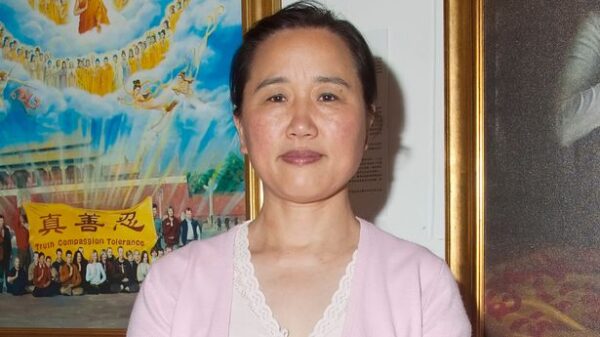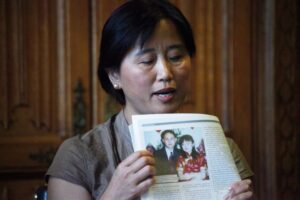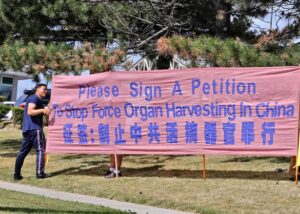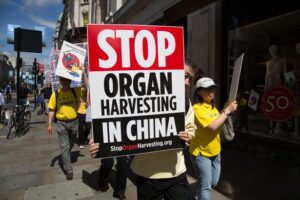‘I survived a labour detention camp where prisoners had their organs harvested’
A woman has recalled the harrowing psychological torture she endured at a labour camp in China where prisoners had their organs harvested.
Annie Yang, 56, was detained in three different camps between March 2005 and September 2006 in China before fleeing to the UK – she has shared her harrowing experience of psychological torture

By Alahna Kindred News Reporter 07:35, 4 Jun 2022
A woman has recalled the harrowing psychological torture she endured at a labour camp in China where prisoners had their organs harvested.
Annie Yang, 56, was detained in three different camps between March 2005 and September 2006 in China before fleeing to the UK.
The Chinese Communist Party detained her because she is a Falun Gong practitioner, a belief system that combines moral philosophy, and she refused to renounce it.
Before she was arrested, Annie was an international antique dealer who travelled between London and Beijing for work.
Annie said she was starved, forced to sit in stress positions, deprived of sleep and wasn't allowed to move without asking for permission.

Annie told The Mirror how she was routinely taken to a police hospital for full-body examinations – which she later learned were for organ harvesting.
She said: “After I arrived at the labour camp – we had regular body tests including liver scans and ultrasounds.
“I had a kidney test, urine test, blood test and also a blood pressure test. From the top to the bottom and all over the body – this was regularly every three or four months but these made me feel very strange.
“Because on one hand they are trying to torture me and on the other, they were giving me a regular check-up
“Next to the camp was a police hospital and we were forced to sit on a big coach with the curtains closed so we couldn't see out. We were not allowed to look up, we had to put both hands on the seat and our heads had to be lowered so we couldn't see others.
“Even when we were walking he had to keep our heads down.
“I didn't know what was happening at the time – it wasn't until I came out of China and read the news about organ harvesting that I realised what they were doing and this was the reason they gave our body tests.

“The moment I learned this my body crumbled – it was really scary. I could have been one of them.”
The forced organ harvesting trade in China is estimated to be worth £810million ($1billion) a year, investigative groups have found.
Part of Annie's harrowing testimony was heard during the China Tribunal – a non-governmental tribunal that looked into the forced organ harvesting claims in China.
The tribunal found that forced organ harvesting is happening across the country based on witness testimony, the gap in reporting figures between the number of organ donors available and the number of transplantations that are happening.Falun Gong supporters stage a quiet demonstration near the UN in New York in 2007 ( Image: AFP via Getty Images)
In some evidence, it was heard that people were paying £50,000 ($65,000) for a kidney, £104,000 ($130,000 for a liver, £120,000 ($150,000) for a heart, £136,000 ($170,000) for a lung.
In one case, the tribunal heard that a liver went for £4 ($5) million.
When Annie refused to renounce her beliefs and in return, she was starved and psychologically tortured.
She said: “Each meal in the morning, they only gave me two tablespoons of Chinese porridge – which is like rice and water boiled together.
In 2013, Annie joined other speakers to give expert testimony on forced organ harvesting to the UK government ( Image: Annie Yang)
“And roughly half a slice of bread – like a Chinese bun – which is very small and very sour and hard.”
She was detained during the summer months when temperatures reached 40C and she was only given 500ml to drink.
She said: “I was forced to sit on a high stool – there was a rule for sitting there. My feet had to be closed and my knees had to be closed and my back had to be very straight. I was not allowed to close my eyes or move.”
She continued: “I was never allowed to go to the toilet when I wanted – I had to report it. I was left waiting for two hours and lost feeling in my bladder.”

Annie said when she was arrested her friends in London put international pressure on the Chinese government so she avoided the brutal beatings, unlike her fellow imprisoned practitioners.
She said: “I could hear other practitioners getting beaten – they used drug addicts to beat them. Sometimes I hear their screams and shouting.
“A drug addict told me it was because of international support that I didn't get beaten.”
When Annie was released she booked a flight to the UK and hasn't gone back.
Terrified of being arrested again, she left her home at 3am and it wasn't until she landed in the UK in 2006 that she felt any relief.

She now has the freedom to practice Falun Gong but she can't return to China – where her family still live.
Her father died two years ago and her mum is in her 80s, but she can't return until the persecution stops.
She said: “I know of another practitioner who went to China to see her parents and she was arrested at the airport and they were asking her about Annie Yang.
“There is still a danger – I would immediately be arrested again. I want more people to be aware of what is happening in China and pay attention to the Chinese Community Party – they can't be trusted.
“I have to speak up and be a voice for other practitioners in China – it is my obligation.”
Professor Martin Elliott, Heart Transplant Surgeon and Member of the China Tribunal, told The Mirror said this practice is “state-sponsored” by the government.
He said: “We haven't found evidence it has stopped. What we heard in the evidence is that hospitals were advertising online and they were these transplant agents.
“You pay to fly yourself to China, you get your transplant, and you recover then go back to your country of origin.”
He added: “You do worry about where it comes from. With ethical transplantation, you wouldn't get one that quickly. You would need a list of potential donors, and they would have to be matched together.
“You need to get the size and tissue matched, if you can get one in short order it's highly unlikely it was ethical.
“If the waiting time is short then there is a high chance it came from these things like these camps.”
During the tribunal, he described how it was impossible to know if the organ had come from someone who was healthy and found that the survival rate of those who received these organs was lower than if it was done ethically.
He said: “We've got hundreds of thousands in camps in China and they are being severely abused, they're being tortured they're being reeducated. They are being subjected to violence and having a lot of blood tests and medical tests which would be inappropriate under those circumstances.
“Organ harvesting is taking place on a spectrum, the spectrum of evil – hundreds of thousands of people are being used as a resource to provide organs for those who need them.
“This is state-sponsored and it's horrific. “e are seeing the equivalent of concentration camps in countries that we trade with and the government has to address if trade trumps human rights.
“I think it's important we find out where our moral red lines are.”
Last month, Global Rights Compliance, an international human rights law firm, published a report advising on the complicity of organ trafficking – with a particular focus on China.
Dr. Julian Sheather, Special Advisor in Ethics and Human Rights, British Medical Association said: “Medical establishments including hospitals, research facilities, professional societies, funding bodies, companies and journals have an international responsibility to respect everyone's human rights and must work to identify and resolve any harm they may cause or contribute to through their practice or be linked to through professional partnerships.”
This “Eyes on Trafficking” story is reprinted from its original online location.

ABOUT PBJ LEARNING
PBJ Learning is a leading provider of online human trafficking training, focusing on awareness and prevention education. Their interactive Human Trafficking Essentials online course is used worldwide to educate professionals and individuals how to recognize human trafficking and how to respond to potential victims. Learn on any web browser (even your mobile phone) at any time.
More stories like this can be found in your PBJ Learning Knowledge Vault.
EYES ON TRAFFICKING
This “Eyes on Trafficking” story is reprinted from its original online location.
ABOUT PBJ LEARNING
PBJ Learning is a leading provider of online human trafficking training, focusing on awareness and prevention education. Their interactive Human Trafficking Essentials online course is used worldwide to educate professionals and individuals how to recognize human trafficking and how to respond to potential victims. Learn on any web browser (even your mobile phone) at any time.
More stories like this can be found in your PBJ Learning Knowledge Vault.
